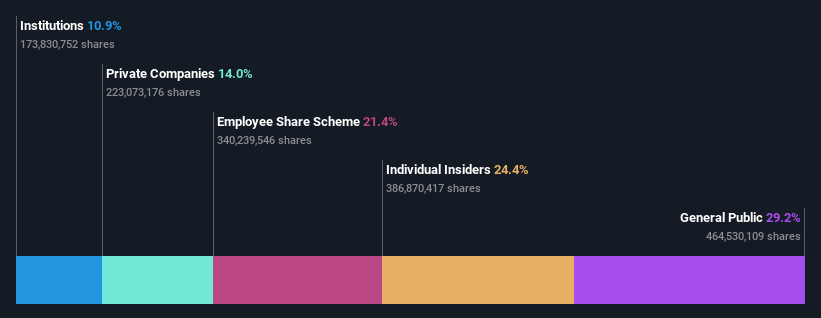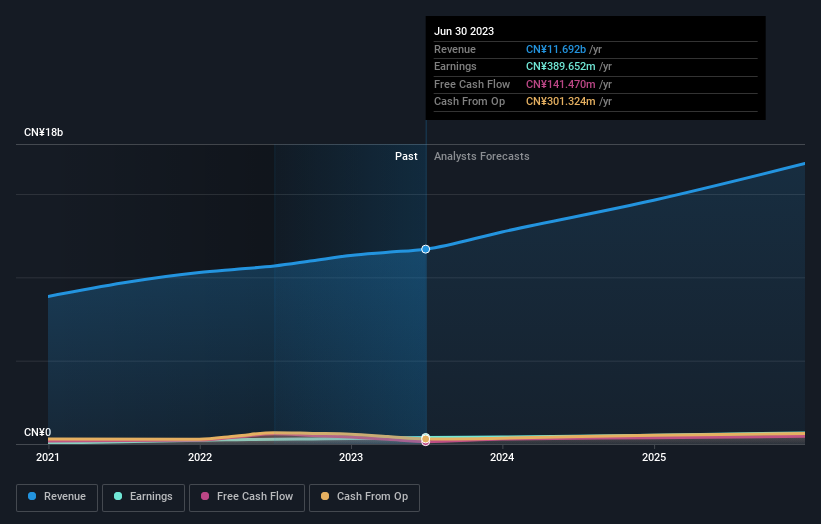- Hong Kong
- /
- Food and Staples Retail
- /
- SEHK:2411
Individual investors invested in Shenzhen Pagoda Industrial (Group) Corporation Limited (HKG:2411) copped the brunt of last week's HK$763m market cap decline

Key Insights
- Shenzhen Pagoda Industrial (Group)'s significant individual investors ownership suggests that the key decisions are influenced by shareholders from the larger public
- The top 3 shareholders own 51% of the company
- 24% of Shenzhen Pagoda Industrial (Group) is held by insiders
If you want to know who really controls Shenzhen Pagoda Industrial (Group) Corporation Limited (HKG:2411), then you'll have to look at the makeup of its share registry. We can see that individual investors own the lion's share in the company with 29% ownership. Put another way, the group faces the maximum upside potential (or downside risk).
Following a 7.6% decrease in the stock price last week, individual investors suffered the most losses, but insiders who own 24% stock also took a hit.
Let's take a closer look to see what the different types of shareholders can tell us about Shenzhen Pagoda Industrial (Group).
Check out our latest analysis for Shenzhen Pagoda Industrial (Group)

What Does The Institutional Ownership Tell Us About Shenzhen Pagoda Industrial (Group)?
Institutional investors commonly compare their own returns to the returns of a commonly followed index. So they generally do consider buying larger companies that are included in the relevant benchmark index.
As you can see, institutional investors have a fair amount of stake in Shenzhen Pagoda Industrial (Group). This implies the analysts working for those institutions have looked at the stock and they like it. But just like anyone else, they could be wrong. When multiple institutions own a stock, there's always a risk that they are in a 'crowded trade'. When such a trade goes wrong, multiple parties may compete to sell stock fast. This risk is higher in a company without a history of growth. You can see Shenzhen Pagoda Industrial (Group)'s historic earnings and revenue below, but keep in mind there's always more to the story.

We note that hedge funds don't have a meaningful investment in Shenzhen Pagoda Industrial (Group). Our data suggests that Huiyong Yu, who is also the company's Top Key Executive, holds the most number of shares at 24%. When an insider holds a sizeable amount of a company's stock, investors consider it as a positive sign because it suggests that insiders are willing to have their wealth tied up in the future of the company. In comparison, the second and third largest shareholders hold about 21% and 5.8% of the stock.
A more detailed study of the shareholder registry showed us that 3 of the top shareholders have a considerable amount of ownership in the company, via their 51% stake.
While studying institutional ownership for a company can add value to your research, it is also a good practice to research analyst recommendations to get a deeper understand of a stock's expected performance. There are plenty of analysts covering the stock, so it might be worth seeing what they are forecasting, too.
Insider Ownership Of Shenzhen Pagoda Industrial (Group)
The definition of company insiders can be subjective and does vary between jurisdictions. Our data reflects individual insiders, capturing board members at the very least. Company management run the business, but the CEO will answer to the board, even if he or she is a member of it.
Most consider insider ownership a positive because it can indicate the board is well aligned with other shareholders. However, on some occasions too much power is concentrated within this group.
Our information suggests that insiders maintain a significant holding in Shenzhen Pagoda Industrial (Group) Corporation Limited. It has a market capitalization of just HK$9.3b, and insiders have HK$2.3b worth of shares in their own names. That's quite significant. It is good to see this level of investment. You can check here to see if those insiders have been buying recently.
General Public Ownership
The general public-- including retail investors -- own 29% stake in the company, and hence can't easily be ignored. While this group can't necessarily call the shots, it can certainly have a real influence on how the company is run.
Private Company Ownership
It seems that Private Companies own 14%, of the Shenzhen Pagoda Industrial (Group) stock. It's hard to draw any conclusions from this fact alone, so its worth looking into who owns those private companies. Sometimes insiders or other related parties have an interest in shares in a public company through a separate private company.
Next Steps:
I find it very interesting to look at who exactly owns a company. But to truly gain insight, we need to consider other information, too.
I always like to check for a history of revenue growth. You can too, by accessing this free chart of historic revenue and earnings in this detailed graph.
Ultimately the future is most important. You can access this free report on analyst forecasts for the company.
NB: Figures in this article are calculated using data from the last twelve months, which refer to the 12-month period ending on the last date of the month the financial statement is dated. This may not be consistent with full year annual report figures.
If you're looking to trade Shenzhen Pagoda Industrial (Group), open an account with the lowest-cost platform trusted by professionals, Interactive Brokers.
With clients in over 200 countries and territories, and access to 160 markets, IBKR lets you trade stocks, options, futures, forex, bonds and funds from a single integrated account.
Enjoy no hidden fees, no account minimums, and FX conversion rates as low as 0.03%, far better than what most brokers offer.
Sponsored ContentNew: Manage All Your Stock Portfolios in One Place
We've created the ultimate portfolio companion for stock investors, and it's free.
• Connect an unlimited number of Portfolios and see your total in one currency
• Be alerted to new Warning Signs or Risks via email or mobile
• Track the Fair Value of your stocks
Have feedback on this article? Concerned about the content? Get in touch with us directly. Alternatively, email editorial-team (at) simplywallst.com.
This article by Simply Wall St is general in nature. We provide commentary based on historical data and analyst forecasts only using an unbiased methodology and our articles are not intended to be financial advice. It does not constitute a recommendation to buy or sell any stock, and does not take account of your objectives, or your financial situation. We aim to bring you long-term focused analysis driven by fundamental data. Note that our analysis may not factor in the latest price-sensitive company announcements or qualitative material. Simply Wall St has no position in any stocks mentioned.
About SEHK:2411
Shenzhen Pagoda Industrial (Group)
Operates as a fruit retailer in China, Indonesia, Singapore, Hong Kong, and internationally.
Fair value with moderate growth potential.
Market Insights
Community Narratives




